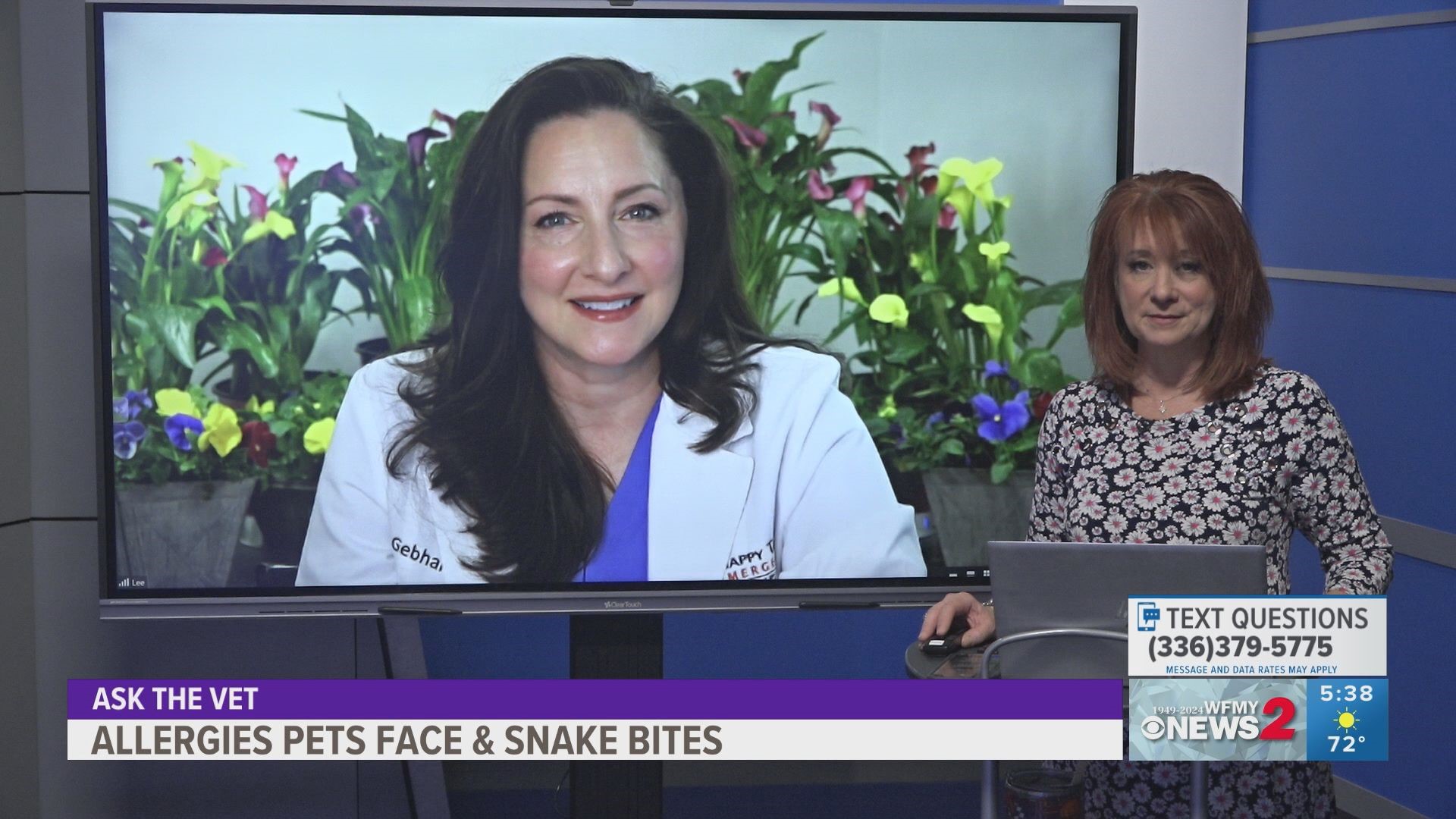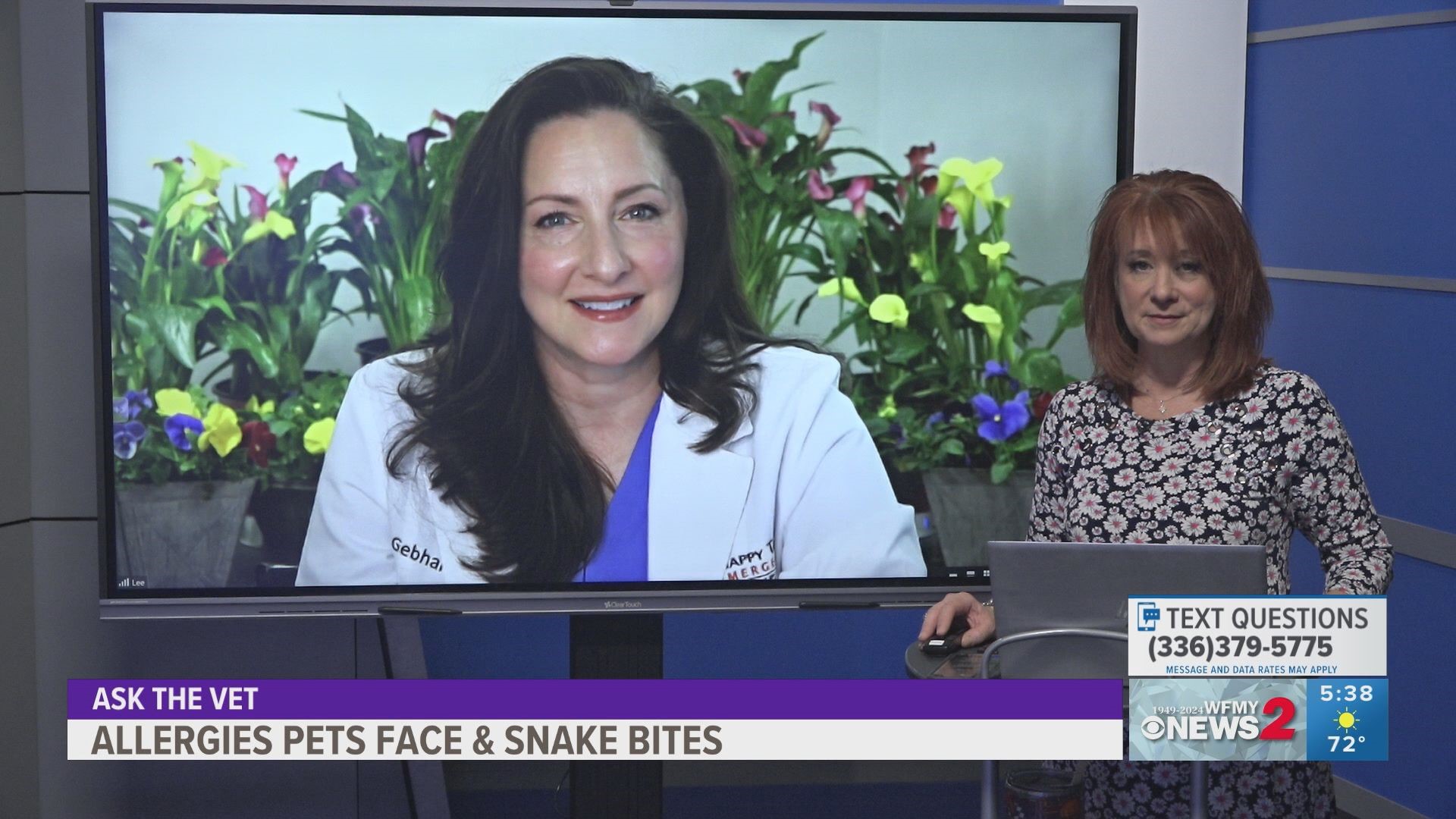GREENSBORO, N.C. — It's spring (or about to be) which means it's time to talk about safety for your outside animals when it comes to snakes and allergies.
Dr. Kelley Gebhardt from Happy Tails Veterinary Emergency Clinic joined us for 2 Wants To Know to discuss these topics and answer your questions.
Snake Bite Safety
Spring marks the start of snake bite season in North Carolina. Snake bites occur most often between March and October, when snakes are most active. A snake bite is always an emergency and can be fatal if not treated immediately.
Reduce the risk of encounters with snakes:
Keep your yard clear of wood piles, undergrowth, brush, and other items.
Eliminate rodents to prevent attracting snakes to your house and yard.
Leash walk pets and avoid walking around tall grasses, bushes, and rocks.
Snakes can strike across a distance equal to half their body length.
Familiarize yourself with common snakes in your area. If your pet is bitten, identifying the snake may help with treatment.
Recognize snake bite symptoms:
Fang marks may or may not be visible
Local or generalized swelling, redness, or purple coloration of the skin
Tenderness to intense pain
Lameness, lethargy, weakness, collapse
What to do if you think your pet has been bitten:
Seek veterinary care for your pet immediately.
DO NOT use cold packs, ice, tourniquets, alcohol, bleed the wound or try to suck out venom.
Keep your pet calm. Limit their activity.
If your pet was bitten on the neck, remove their collar.
Do not try to catch or kill the snake to bring it to the veterinarian.
******************************************************
Allergies
What types of allergies can pets have?
- Fleas (flea allergic dermatitis – the most common skin disease in dogs).
- Environmental – insects (bees, wasps, etc.), trees, grass, pollen, house dust mites, molds, other dogs and cats.
- Food – can be due to protein, carbohydrate, preservative, or food dye.
- Vaccine reactions.
- If your pet’s allergy symptoms worsen during a certain time of year (spring or fall), then seasonal environmental allergies are most likely.
- If the allergy symptoms do not change throughout the year, then they may have non-seasonal environmental allergies, flea allergies, or food allergies.
What are the symptoms of allergies?
- Persistent scratching and chewing (feet, body, ears, tail base, all over body).
- Pink or red skin.
- Hair loss.
- Secondary skin infections from scratching and chewing.
- Ear infections – allergies are the most common cause of ear infections in dogs.
- Feline asthma.
- Hives and facial swelling.
- Severe allergic reactions can cause vomiting, diarrhea, weakness, and collapse.
Why is it important to address pet allergies?
- Most importantly, to improve your pet’s overall comfort and quality of life.
- To prevent secondary infections from skin inflammation, scratching, and chewing (ie. Skin infections, ear infections).
- A happy byproduct of managing your pet’s allergies is that it will also save you money by not having to treat these secondary infections that often require antibiotics, antifungals, steroidal anti-inflammatory medications, and medicated baths.
How are allergies diagnosed?
- To definitively diagnose underlying environmental allergies, your pet would need allergy testing through a veterinary dermatologist. This includes skin testing and blood test to look for the specific underlying allergy. These tests would allow the dermatologist to create an allergy shot (allergen-specific immunotherapy) to decrease your pet’s sensitivity to the allergens.
- If a food allergy is suspected, then a food trial would be recommended in which the diet is limited to ingredients your pet has never eaten before. If the allergic symptoms resolve, then your pet would then be started on a special diet.
What are the treatments for allergies?
- 100% flea control is essential for dogs with flea allergies. Flea allergy is caused by the flea’s saliva. One flea bite is enough to cause allergic symptoms. All pets in the household must be on proper flea preventatives year-round.
- Allergy symptoms are managed with medications. Long term use of some anti-allergy medications, such as steroids, can result in other health problems. Fortunately, there are many new medications available to help decrease allergic symptoms in our pets and these medications have fewer side effects. These medications do not cure the allergy, but instead decrease the symptoms. Without addressing the underlying allergy, the symptoms will return once the medications are stopped.
- Treat the underlying secondary infections (skin, ears, etc.) with medications and medicated baths.
- Avoid/limit exposure to environmental allergens. It is not possible to remove all allergens from our environment. However, bathing can help remove allergens from our pet’s skin and decrease their exposure/contact time. Soothing cream rinses and sprays can moisturize the skin and decrease itching.
Can allergies be cured?
- Allergies are usually not cured but rather managed and controlled throughout the pet’s life.


